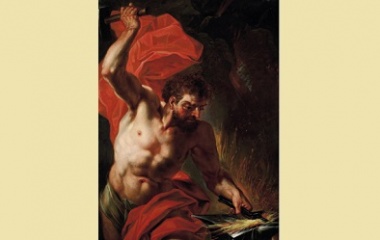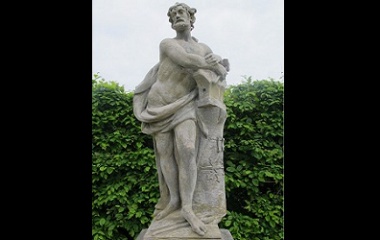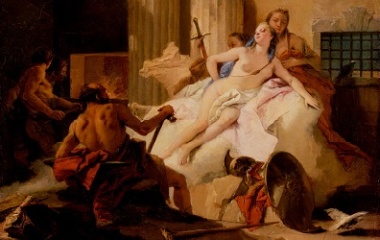Fast Facts:
- Pronunciation: vuhl-kuh-n
- Origin: Rome
- Role: God of fire and the blacksmith of the gods
- Parents: Jupiter, Juno
- Wife: Venus
- Symbols: Fire, blacksmith’s hammer, axe
- Greek counterpart: Hephaestus
Who Is Vulcan?
In addition to being known as the Roman god of fire and a member council of gods, Vulcan had the distinction of being the only ugly god. His father, Jupiter, had numerous children, but none with his wife, Juno, who wanted her own child. Juno decided to have a baby on her own, which led to the birth of Vulcan. He was a red-faced and crying baby, so unattractive that the shocked Juno tossed him off Mount Olympus. After a full day and night of falling from the heavens, he landed in the sea.
The fallen child broke both of his legs, which left him with a permanent limp. The sea nymphs collected the child and raised him. He spent his young years happily wandering the beach, where he found coal which he collected in shells and stored in an underwater grotto. Eventually, he made a fire from the coal and learned to craft beautiful objects.
Vulcan became so skillful he became known as the blacksmith of the gods. He created their objects of beauty and magical weapons.
Origin
The talented craftsmen had a special love and appreciation for one of the nymphs who saved him, and crafted a stunning pearl necklace as a gift. She was most proud of her necklace and wore it to a god party on Mount Olympus. Juno was amazed by its beauty and insisted on knowing how to acquire one for herself. Upon learning that it was her abandoned child who crafted the beautiful object, she insisted he return to her.
Vulcan wasn’t very enthusiastic about returning to the home of the mother who tossed him off a mountain. Instead, he send a gift to Juno. It was a magical chair made of gold and adorned with jewels. Delighted with her gift, Juno promptly sat down on it, but the chair entrapped her with unbreakable chains. There she sat for three days, unable to leave her seat.
Finally, Jupiter made a deal with Vulcan to save his wife. He promised Vulcan the beautiful goddess Venus in return for Juno’s release. Vulcan returned to Mount Olympus and had his stunning bride.
Marriage of Vulcan
Venus was the goddess of beauty, and was considered the fairest of all the goddesses. Ironically, she ended up married to the ugliest god. Perhaps this is what led her astray, as she was quite unfaithful to Vulcan with various lovers.
At one point, Venus took up an affair with Mars, the god of war, and the brother of her husband. When he learned of the relationship, Vulcan was outraged and he crafted an unbreakable golden net to trap the adulterers. He had them caught in the net and called the other gods to ridicule and embarrass them. However, events didn’t quite pan out as he hoped. Jupiter was irritated with him for making such a spectacle of the affair, and the other gods made fun of Vulcan instead. He decided it was worth his own humiliation to have his beautiful Venus.
According to the legends, whenever Venus had an affair, Vulcan would get so angry he would erupt a volcano. This is the reason there are so very many volcanoes.
Minerva
Prior to his marriage to the beautiful Venus, most of Vulcan’s troubles stemmed from his lack of attractiveness. One day, Jupiter had a terrible headache that wouldn’t subside. In an effort to be helpful, Vulcan took an axe and split open his father’s head. Minerva, the goddess of wisdom, was created as she sprung out of Jupiter’s split head. Vulcan fell in love with her immediately, but she wasn’t interested in the ugly god at all and turned him down flat.
Pandora
When mankind stole the secrets of fire, Jupiter was outraged and called upon the other gods to create a poisonous gift as punishment. It was Vulcan who molded the lovely but foolish Pandora from clay.
Upon her marriage to the Titan Epimetheus, she brought a gift from the gods. It was a box, with a warning that it was not to be opened. It became known infamously as Pandora’s Box, as once she opened it, all evil was let loose into the world.
Historical Influence
Each August 23, a festival called Vulcanalia was held in honor of Vulcan. The oldest shrine to Vulcan was located in the Roman Forum at the base of the Capitoline Hill, one of the Seven Hills of Rome. The Romans were advised that shrines to Vulcan should be located outside the city limits in order to avoid celebratory fires in the city. They gave sacrifices to save the grain and food in the fields from harm of fire.
The Romans associated the time of the festival with earthquakes, fires and volcanic eruptions. During 64 AD, the great fire of Rome occurred. It was believed that Vulcan needed to be placated after this event, and additional larger sacrifices were made to the god during Vulcanalia each year.
Unfortunately, despite the sacrifices, one day after August 23, 79 AD the great eruption of Mount Vesuvius that cause the destruction of Pompeii and Herculaneum took place.
Modern Influence
Perhaps the most notable reference in modern culture to Vulcan is the race of extraterrestrial aliens being named after him in Star Trek. The Vulcan planet had a surface filled with fire, fields of lava and volcanoes, seemingly in direct reference to the god. The Vulcanite race appeared to have a greenish hue due to their copper-based blood (Vulcan was the god of metals). Additionally, like the Roman god, Star Trek’s Vulcans were skilled craftsmen and were known for originating technology.
Vulcan






No comments:
Post a Comment